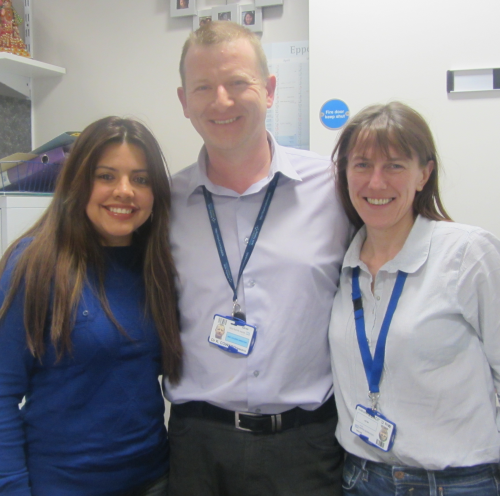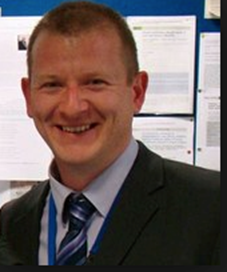The view of a builder of future geniuses in the reproductive field.
By Lucy Coleman and Kevin Coward.

Kevin Coward is a colleague and friend who I admire a lot. I met Kevin about 10 years ago in Oxford. We were both seating at the same desk writing and reading papers non-stop, talking about interesting projects and our wishes for the future. He was offered the role as Director of the MSc. Course in Embryology at Oxford University in England – UK, and I ended up specializing in reproductive medicine and embryology.
His embryology course is one of the best and most wanted around the world, because of the quality of professors and teaching techniques they use.
Celine Jones (with us in the photo) has been an amazing collaborator as well. They both were awarded with the Ox Talent award (Teaching and learning enhanced by New Technology) for innovative use of technology recently in 2013.
Dr. Kevin Coward has a PhD in Reproductive Physiology and Endocrinology from the University of Stirling in Scotland. He has gained lots of experience in the reproductive field working alongside several well-known researchers, and is now working in several projects with sperm and eggs.
He was kind enough to answer some questions to provide an insight on the goals and achievements from someone who has spent his entire life dedicated to research and innovative techniques that might one day revolutionise the world of reproductive medicine.
What is your vision of current research regulations in the UK? Are they necessary? What would happen if there were no regulations?
Fertility treatment and research using reproductive material is regulated in the UK by the Human Fertilisation and Embryology Authority. Further regulation is imposed by the National Research Ethics Service, and by the Human Tissue Act. Collectively, this three-tier approach ensures that scientists and clinicians can only use human cells and tissues in research projects for specific goals using specific techniques. This also ensures that material can only be used when patients have given informed written consent, and have been given detailed patient information sheets describing in simple terms what is happening to their cells/tissue, how, why, and who is involved. Without such regulation, there would be no requirement for peer-review (as would normally happen by both HFEA and NRES Committees which include scientists, clinicians, and members of the general public) and therefore, patient samples (including DNA) could be used indiscriminately for a whole range of projects that had not been sanctioned or scrutinised. This could easily lead to the exchange of patient material between research groups, or between countries, possibly in response to financial arrangements, and without the donating patient knowing.
Do you think a worldwide regulation for research would be beneficial?
Yes. This would promote significant reproducibility and consistency in the way in which scientists approached their clinical work and readily encourage collaborative ventures. Ultimately, such a regulated and consistent approach would directly lead to improved patient care and treatment outcome.
There are many issues and different points of view regarding egg and embryo research. Is that a controversial subject?
Very controversial and highly variable when one considers the global position. Some countries adopt highly regulated approaches while others do not. Regulation prevents the indiscriminate use of human material in research, ensures that the research being carried out is warranted and worthwhile, and promotes confidence and reproducibility in results, while protecting patient interests and anonymity.
Are there any recommendations to people in the reproductive field looking to do research?
Ensure that one approaches research with an informed and robust attitude. Ensure research projects are warranted and worthwhile. Ensure that systematic literature reviews, along with experimental design and tests of the statistical power required for proof-of-principle, are carried out before the research programme is commenced. Encourage peer-review of all research projects. Ensure that material is acquired, stored, and utilised in a regulated manner and that appropriate levels of research governance are imposed – such as secure data management and protection of all personalised patient data. Encourage blinded research and the use of appropriate controls. Promote intense peer-review of all publications arising from research. Encourage regular review of all procedures and policies.
Where are we going to with reproductive research?
Research in our field aims to promote our understanding of human infertility both in terms of the mechanisms underlying such problems and the development or modification of treatment options to circumvent such issues. We do this by developing new hypotheses, technologies and equipment, or by modifying existing techniques or equipment from other fields in line with scientific advancement. Collectively, research at the clinical and basic science level, aims to promote better diagnostic and treatment options for patients, to improve treatment outcome, and to provide patients with the best levels of care.
Is there any messages to the general public regarding what we are doing with reproductive research?
In general, all research effort in our field, aims to promote improved levels of diagnosis and treatment and to improved treatment outcome. Essentially, everything we do is driven by the need to provide patients with the best level of care at all times.
Venezuela has no regulations or legislation in fertility practices. Should we propose to be regulated or is it better not to have control?
Yes. I think it is critical that Venezuela adopts appropriate research and clinical legislation based upon established systems such as that of the Human Fertilisation and Embryology Authority (HFEA) in the UK. From the patient’s perspective, regulation provides the security and understanding that the procedures and techniques being used have been fully optimised and risk-assessed and that all medical personnel are carrying out such procedures in a standardised manner. This will prevent the risk of malpractice and instil confidence in the industry. This will also encourage patients to contribute to research projects and attract attention from potential collaborators overseas. This would promote the clinical research profile of Venezuela.
 Do you consider yourself an innovative person?
Do you consider yourself an innovative person?
Absolutely. I rigorously adopt innovation and resourcefulness in both my research and teaching practice as this is the only way to teach and inform others of a subject area that exhibits such dynamic changes as ours. From a research point of view, innovation is a key requirement in order to maintain originality and motivate fellow researchers.
Having done this job as a head of an MSc course in embryology, might had given you lots of experiences to talk about.
Can you discuss some of the most relevant?
I have enjoyed my job immensely over the last five years and I learn something new from every different class I teach. In five years, we have had representatives from over 28 different countries. The approach to human infertility treatment varies significantly across the world and many of our students join our course in order to appreciate the UK’s approach to the treatment, diagnostics, along with regulatory, legal, and ethical aspects of treatment and to translate this information back to their host nations. In doing this, our students are adopting an admirable strategy and encouraging a consistent approach. We now have graduates all over the world, who, in effect, act as ambassadors for the field in the promotion of good practice. It has been an honour to be involved and I will never tire of witnessing the motivation, inspiration and resilience of our students.
Many people consider fertility specialists to go against nature. What do you think about this statement?
It is of course entirely understandable that our field is questioned on religious, ethical and moral grounds. However, the facts are now very clear – over 1 in 7 couples globally are now classified as being infertile. That is, they are unable to achieve the one thing that many deem to be the most natural event in one’s life – that of producing progeny. The effect of infertility is highly emotional and traumatic for those concerned. In many cases, the desire to have a child out-weighs all over life goals. We now have the ability to rescue fertility in many cases in a safe, regulated, and consistent manner. I think it is therefore down to the individual as to whether they see our field as being controversial or going against nature. At the end of the day, it is the choice of the infertile couple that is important – they can either choose to go ahead or not. If my research can help even a small number of couples achieve the one thing they desire so much but cannot produce naturally, then my time and effort has been well spent.

